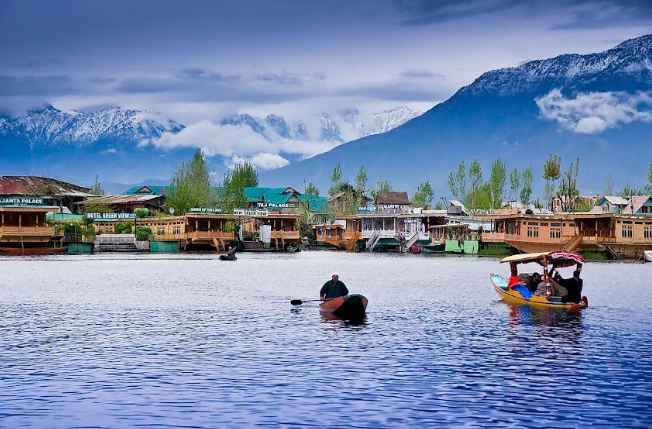by Muhammad Mohsin Iqbal
Kashmir has always held a central place in the heart of Pakistan, not merely as a geographical entity but as an inseparable part of its ideological and strategic framework. Its significance transcends political disputes and territorial claims, deeply intertwining with the spiritual, economic, and historical essence of Pakistan. It was this profound connection that led Quaid-e-Azam Muhammad Ali Jinnah to declare, “Kashmir is the jugular vein of Pakistan.” This statement was neither rhetorical nor confined to a mere strategic perspective; rather, it encapsulated the essence of Kashmir’s integral role in the very identity of Pakistan.

Religiously, Kashmir is an inseparable part of the Muslim world. Islam spread across the valley centuries ago, shaping its culture, traditions, and way of life. The region has produced renowned saints and scholars who played a vital role in spreading Islamic teachings across South Asia. The majority of Kashmir’s population, adhering to Islam, has historically maintained strong religious, cultural, and emotional ties with the Muslims of Pakistan. The Partition of 1947 was a manifestation of the Two-Nation Theory, based on the distinct religious and cultural identities of Muslims and Hindus. It was, therefore, only natural that Kashmir, with its overwhelming Muslim majority, would align with Pakistan. However, the unjust and forceful occupation of the region by India contradicted the very basis of this division, leading to an unresolved conflict that continues to weigh heavily on the collective conscience of the Muslim world.
The struggle of the Kashmiri people for self-determination is not just a political battle; it is a religious duty for Pakistan to support them. The oppression, persecution, and human rights violations inflicted upon the people of Kashmir are a grave concern for the Muslim Ummah. The desecration of mosques, restrictions on religious gatherings, and brutal crackdowns during Islamic observances underscore the systematic efforts to suppress their faith. The spirit of Muslim brotherhood and the obligation to stand against injustice make Kashmir a cause that resonates deeply with Pakistanis. It is not just a land dispute; it is a matter of faith, dignity, and moral responsibility.
Beyond its religious significance, Kashmir is crucial for Pakistan’s survival and prosperity. The valley is the origin of the major rivers that sustain Pakistan’s agriculture, the backbone of its economy. The Indus, Jhelum, and Chenab rivers flow from the Himalayas through Kashmir into Pakistan, providing water for irrigation, drinking, and hydroelectric power generation. India’s control over these water sources poses a perpetual threat to Pakistan’s food and energy security. The Indus Waters Treaty, though an international agreement, has been repeatedly challenged by Indian policies aimed at altering the natural flow of these rivers. The potential weaponization of water remains an alarming possibility that underscores why Kashmir is more than just a territorial concern—it is a lifeline for Pakistan’s agricultural and economic stability.
The geographical position of Kashmir further elevates its strategic importance. It serves as a natural gateway between South Asia and Central Asia, making it a crucial point for trade, security, and defense. The Line of Control (LoC) remains a volatile frontier where tensions frequently escalate, demanding continuous vigilance from Pakistan’s armed forces. The presence of Indian military installations in the region and its growing defense cooperation with external powers threaten Pakistan’s security. Control over Kashmir, or at the very least, ensuring that it does not become a hub of hostility against Pakistan, is essential for maintaining regional stability.
Quaid-e-Azam’s assertion that Kashmir is Pakistan’s jugular vein was not just a statement of political ambition; it was an acknowledgment of an existential truth. The oppression of the Kashmiri people, the economic implications of losing control over water resources, and the broader strategic vulnerabilities make Kashmir an inseparable part of Pakistan’s national interest. The ideological connection, rooted in the very foundation of Pakistan, further cements its place in the national consciousness.
Sir Owen Dixon, the former UN mediator on Kashmir, observed in his report to the United Nations in 1950, “The only just solution to the Kashmir dispute is a plebiscite under international supervision, allowing the people to determine their own future.” Yet, despite international recognition of Kashmir as a disputed territory, the voices of its people continue to be suppressed.
For over seven decades, Pakistan has stood by Kashmir, advocating its cause on diplomatic fronts, raising its voice in international forums, and extending moral and material support to its people. While global powers have often remained indifferent or complicit in India’s oppressive policies, the resilience of the Kashmiri people and Pakistan’s unwavering stance continue to keep the issue alive. The challenge remains formidable, but history has shown that no force can permanently suppress the will of the people.
The significance of Kashmir for Pakistan is not a matter of debate; it is a reality deeply embedded in its national, religious, and strategic fabric. The vision of Quaid-e-Azam, the sacrifices of the Kashmiri people, and the continued struggle for their rightful place in the world remain a collective responsibility of Pakistan. It is a cause that transcends political divides and resonates with every heart that believes in justice, freedom, and faith. Kashmir is not just an issue; it is an unfinished chapter of history that demands resolution in accordance with the aspirations of its people. Until that day comes, Pakistan will continue to stand firm, for Kashmir is not just a part of its geography—it is its soul, its faith, and its jugular vein.

















